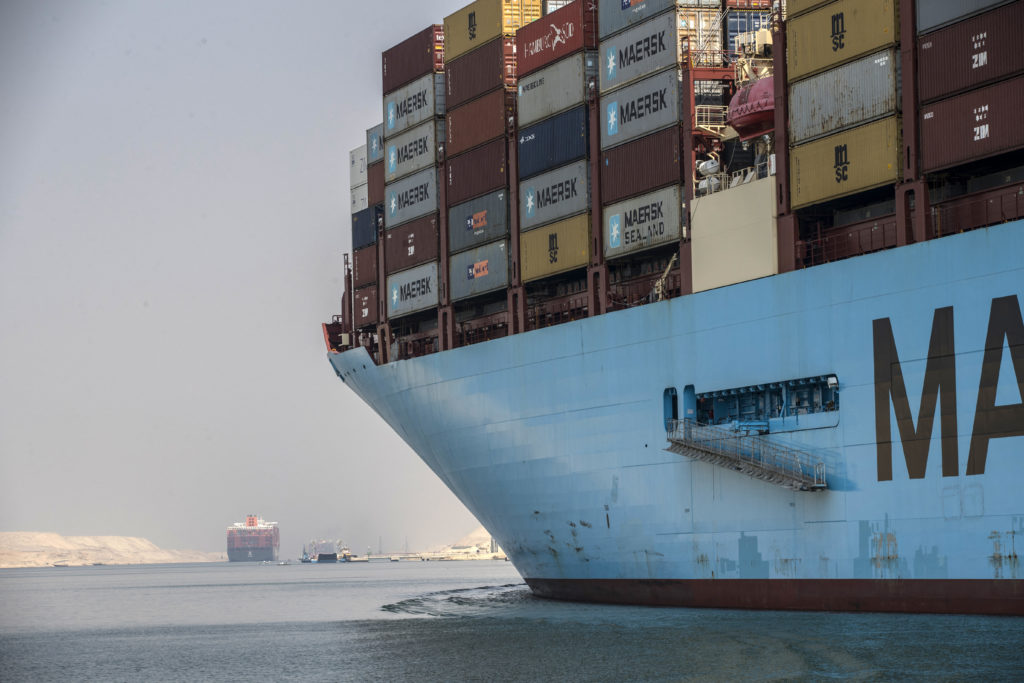São Paulo – The Brazilian private sector will request to anticipate tariff reductions in the free trade agreement between Mercosur and Egypt, in addition to demanding the inclusion of new products, revision of origin regulations for some sectors, and improvement of policies related to non-tariff barriers. The information was reported to ANBA by the International Integration Policies manager of the Brazilian National Confederation of Industry (CNI), Fabrizio Panzini. Pictured above, a ship traveling the Suez Canal in Egypt.

CNI represents the private sector in talks with the Brazilian national government on matters of international trade agreements. According to Panzini, the requests will be systematically sent to the government for the next meeting of the Joint Committee of the Mercosur-Egypt Free Trade Agreement. Brazil is in the pro-tempore presidency of the South American bloc, and, according to the Brazilian Ministry of Foreign Affairs, the two parties intend to schedule the meeting for mid-September.
“Proposals for the meeting’s program are still being evaluated by the parties and may include discussion on the revision of items in the agreement’s tariff reductions,” informed the Ministry to ANBA when asked about the possibility of discussing the anticipation of reductions. Reductions occur when tariffs on products for entry into countries are waived, as provided for in free trade agreement.
In the agreement with Egypt, some products were exempted from tariffs when it entered into force in September 2017. Other goods are gradually receiving a reduction; the last ones will reach zero tariffs in ten years. There is also an exclusion list, with products determined by the parties not to have tax reductions in the agreement.
The Brazilian private sector wants to introduce products from this exclusion list in the agreement, allowing new products to enter Egypt with the waiver of tariffs. The intention is to include some food products. However, the acceleration of the reduction is mainly demanded for products such as iron and steel tubes, tubes in general, compressors, paper, chassis, plywood products, and other foods.
“What we are asking for is a review of this agreement precisely to include more products and to get closer to what we call total free trade,” says Panzini on the possibility. He recalls the agreement took a long time to come into force, which is why he believes the schedule of reductions should be revised. It was signed in 2010, but it took seven years for all Mercosur members to approve it in their legislatures – Argentina was the last. Egypt approved it in 2013.
Origin regulations
In addition to tariff reductions, agreements often include other areas relevant to international trade, such as origin regulations. The Brazilian industry wants to renegotiate the origin regulations of the Mercosur-Egypt agreement applied to the automobile and auto parts sectors. These regulations determine, for example, how many national components a product must have to be granted the tariff reduction of a trade agreement.
“The origin regulations of both sides are stringent, which ends up not allowing the countries to enjoy this trade agreement,” argues Panzini. He claims the regulations should be more realistic with each country’s production. In the case of the two mentioned sectors, they have made access to the Egyptian market difficult. In the automobile sector, the idea is to facilitate not only the sale of passenger vehicles but also buses, trucks, and other heavy vehicles. Origin regulations are negotiated separately for each product in agreements.
Brazilians also want to expand the regulatory scope of the agreement. “So we can have, for example, more modern guidelines related to non-tariff barriers, that is, technical, commercial, sanitary and phytosanitary barriers,” refers Panzini. The executive advocates for terms providing more transparency in the policies adopted by both sides. “So a sanitary measure simply does not come into effect without prior notice,” he says.
The animal protein sector, mainly poultry, wants an increase in the quotas allowed to enter Egypt with a tariff benefit. When the volume determined in the reduced tariff agreement is reached, Brazil has to export the product to the Egyptians at a full rate. “The sector claims it supplies the tonnage, which is very low, very quickly, and there is a market, there is demand from Egypt for this chicken meat, to sell more,” says Panzini.
Meeting
The CNI’s International Integration Policies manager affirms these requests have already been carried by the CNI to the agreement meetings at other times and will be brought up again. Panzini believes the Egyptians will also bring their pleas to the meeting, which he sees as natural. “If they have nothing to gain, they probably will not accept these requests from us,” he says. CNI does not participate in the meeting, but government representatives do.
The executive points out that Egypt, as one of the largest economies in Africa, is an important market for Brazil and one of the few countries with which Mercosur has an agreement outside South America. “There is an exciting market for Brazil in industrial products and agribusiness foods,” says Panzini about Egypt. For this reason, Brazilian companies want agility in trade.
Translated by Elúsio Brasileiro




